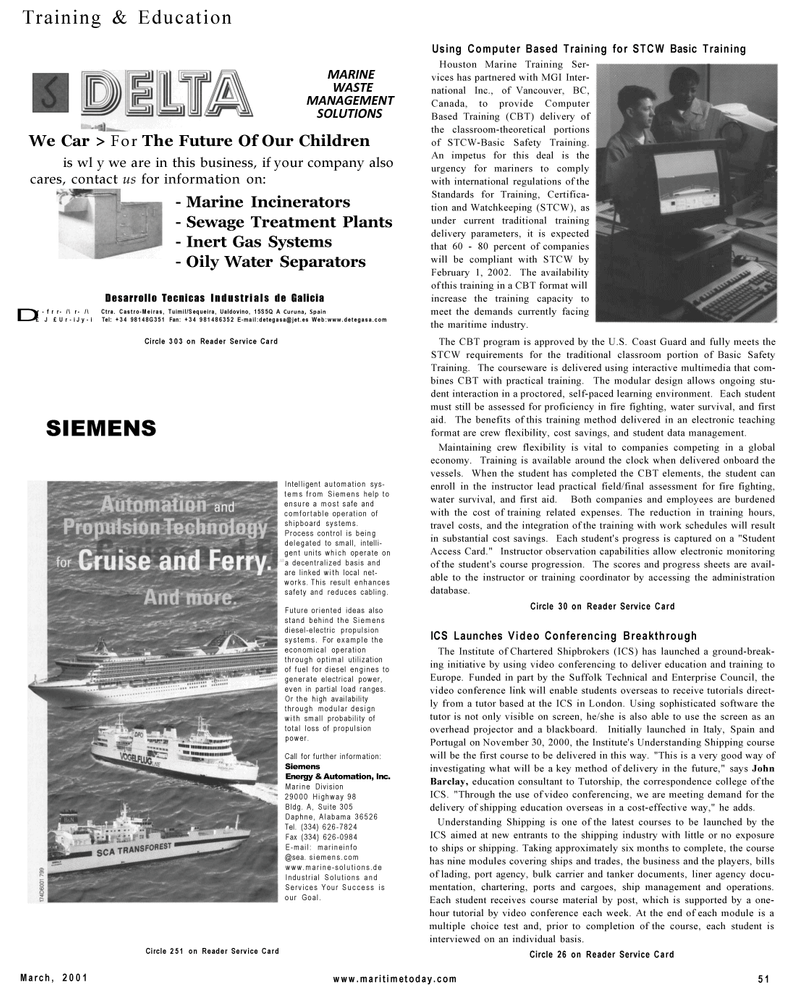
Page 51: of Maritime Reporter Magazine (March 2001)
Read this page in Pdf, Flash or Html5 edition of March 2001 Maritime Reporter Magazine
Training & Education
MARINE
WASTE
MANAGEMENT
SOLUTIONS cares, contact us for
We Car > For The Future Of Our Children is wl y we are in this business, if your company also information on: - Marine Incinerators - Sewage Treatment Plants - Inert Gas Systems - Oily Water Separators
Desarrollo Tecnicas Industrials de Galicia
Dr-f r r- /\ r- /\ Ctra. Castro-Meiras, Tuimil/Sequeira, Ualdovino, 15S5Q A Curuna, Spain £ J £ Ur-i Jy-i Tel: +34 98148G351 Fan: +34 981486352 E-mail:[email protected] Web:www.detegasa.com
Circle 303 on Reader Service Card
Using Computer Based Training for STCW Basic Training
Houston Marine Training Ser- vices has partnered with MGI Inter- national Inc., of Vancouver, BC,
Canada, to provide Computer
Based Training (CBT) delivery of the classroom-theoretical portions of STCW-Basic Safety Training.
An impetus for this deal is the urgency for mariners to comply with international regulations of the
Standards for Training, Certifica- tion and Watchkeeping (STCW), as under current traditional training delivery parameters, it is expected that 60 - 80 percent of companies will be compliant with STCW by
February 1, 2002. The availability of this training in a CBT format will increase the training capacity to meet the demands currently facing the maritime industry.
The CBT program is approved by the U.S. Coast Guard and fully meets the
STCW requirements for the traditional classroom portion of Basic Safety
Training. The courseware is delivered using interactive multimedia that com- bines CBT with practical training. The modular design allows ongoing stu- dent interaction in a proctored, self-paced learning environment. Each student must still be assessed for proficiency in fire fighting, water survival, and first aid. The benefits of this training method delivered in an electronic teaching format are crew flexibility, cost savings, and student data management.
Maintaining crew flexibility is vital to companies competing in a global economy. Training is available around the clock when delivered onboard the vessels. When the student has completed the CBT elements, the student can enroll in the instructor lead practical field/final assessment for fire fighting, water survival, and first aid. Both companies and employees are burdened with the cost of training related expenses. The reduction in training hours, travel costs, and the integration of the training with work schedules will result in substantial cost savings. Each student's progress is captured on a "Student
Access Card." Instructor observation capabilities allow electronic monitoring of the student's course progression. The scores and progress sheets are avail- able to the instructor or training coordinator by accessing the administration database.
Circle 30 on Reader Service Card
Intelligent automation sys- tems from Siemens help to ensure a most safe and comfortable operation of shipboard systems.
Process control is being delegated to small, intelli- gent units which operate on a decentralized basis and are linked with local net- works. This result enhances safety and reduces cabling.
Future oriented ideas also stand behind the Siemens diesel-electric propulsion systems. For example the economical operation through optimal utilization of fuel for diesel engines to generate electrical power, even in partial load ranges.
Or the high availability through modular design with small probability of total loss of propulsion power.
Call for further information:
Siemens
Energy & Automation, Inc.
Marine Division 29000 Highway 98
Bldg. A, Suite 305
Daphne, Alabama 36526
Tel. (334) 626-7824
Fax (334) 626-0984
E-mail: marineinfo @sea. siemens.com www.marine-solutions.de
Industrial Solutions and
Services Your Success is our Goal.
SIEMENS
Circle 251 on Reader Service Card
ICS Launches Video Conferencing Breakthrough
The Institute of Chartered Shipbrokers (ICS) has launched a ground-break- ing initiative by using video conferencing to deliver education and training to
Europe. Funded in part by the Suffolk Technical and Enterprise Council, the video conference link will enable students overseas to receive tutorials direct- ly from a tutor based at the ICS in London. Using sophisticated software the tutor is not only visible on screen, he/she is also able to use the screen as an overhead projector and a blackboard. Initially launched in Italy, Spain and
Portugal on November 30, 2000, the Institute's Understanding Shipping course will be the first course to be delivered in this way. "This is a very good way of investigating what will be a key method of delivery in the future," says John
Barclay, education consultant to Tutorship, the correspondence college of the
ICS. "Through the use of video conferencing, we are meeting demand for the delivery of shipping education overseas in a cost-effective way," he adds.
Understanding Shipping is one of the latest courses to be launched by the
ICS aimed at new entrants to the shipping industry with little or no exposure to ships or shipping. Taking approximately six months to complete, the course has nine modules covering ships and trades, the business and the players, bills of lading, port agency, bulk carrier and tanker documents, liner agency docu- mentation, chartering, ports and cargoes, ship management and operations.
Each student receives course material by post, which is supported by a one- hour tutorial by video conference each week. At the end of each module is a multiple choice test and, prior to completion of the course, each student is interviewed on an individual basis.
Circle 26 on Reader Service Card
March, 2001 www.maritimetoday.com 51

 50
50

 52
52
